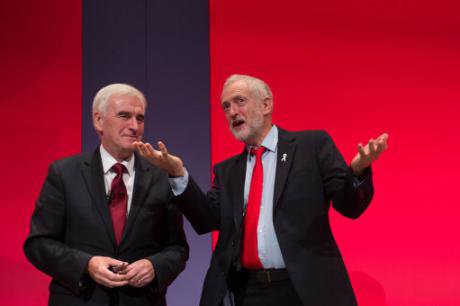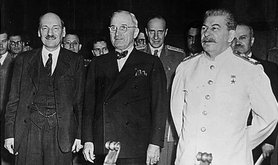
John McDonnell and Jeremy Corbyn. Photo: Stefan Rousseau / PA Wire/Press Association Images. All rights reserved.
If you want to understand what Labour conference was like in 2015, know this: after it was over, I had to take several days off work to recover. Last year Corbyn had just won the leadership, and although his victory had been expected, the resultant acrimony was intense. People roared at one another in fringe meetings, journalists stalked the halls looking for scandals, the left was exuberant, the right was indignant. It was exhausting and stressful.
So it was with some trepidation that I returned to Labour conference this year. After a summer of vicious infighting (like last year, but worse), I assumed the conference would be even more embittered this time. I thought there might even be punch ups. Instead, what I found was a Labour party that belonged to Jeremy Corbyn. Other traditions in the Labour party were present, and of all of them it was the Blairites who seemed most dejected and defeated. Far from being determined to take the party back, they just seemed lost.
The most salient evidence of this was the rally for Progress, the Blairite version of Momentum. As always, everyone was well-dressed, manicured and slick, but in many ways it reminded me of the rallies held by the Labour left I used to attend five years ago. The usual suspects were huddled in a room out of the conference zone, angrily lamenting the loss of their party, promising to take it back, but without a clue of how to do it. The gist of the speeches was that ordinary people are frustrated and want change, but it’s unrealistic to expect policies that alter the system too much – and besides, there’s nothing you can do about globalisation anyway. The standard worshipping of Blair was also a feature, although this nostalgia was an odd sight from a group of people in love with their self-image as modernisers. In short, Progress seemed utterly hopeless: struggling and failing to come to terms with the incredible sea change in their own party, but also with what the wider public wants. I left early, feeling totally dejected. As a journalist aligned with the left of the party, I have no personal interest in Progress succeeding, but as a colleague put it to me: “you went there expecting them to be Bond villains under a volcano. Instead you discovered Dr Evil – which makes the left Austin Powers, not James Bond.” Progress seemed utterly hopeless: struggling and failing to come to terms with the incredible sea change in their own party, but also with what the wider public wants.
And the conference as a whole, now dominated by the left, probably was less James Bond than previous years. For one thing, there were significantly fewer men in shiny suits, the corporate and third sector lobbyists having all but abandoned ship. I imagine the average Corbyn supporter is quite happy to wave goodbye to this side of the conference, but it’s also true to say that lobbyists only talk to people they regard as having power and influence, so perhaps their absence does not bode well for Labour.
It was also strange to see lobby journalists looking somewhat out of sorts. As I was walking to a restaurant to have lunch with a shadow minister, we were accosted by a hack looking for information. The balance of power has certainly shifted away from these people, and towards those who have historically been patronised in the media as token lefties. Several hacks asked me over the course of the conference whether I had any interesting stories. This was a rather surreal experience, and makes me wonder whether Corbyn’s poor treatment by the press is partly the result of lobby correspondents who are confused by, and shut out of, a new wave of power within the party. Perhaps their attacks on Corbyn are a symptom of their own marginalisation as much as anything else.
This was the first year new joiners under Corbyn attended conference en masse. Most of them stuck with the Momentum festival, 'The World Transformed', a short walk away from the official conference. Those I spoke to were typically sweet and engaged, very uninterested in the machinations of Westminster, and hoping to change the world. There was an obvious difference, though, between those who have been in and around the party for some time, and those who have joined under Corbyn. The former (which includes myself) were quite happy to socialise with Blairites and those from other factions, as members of a large dysfunctional family. Newer members didn’t seem to understand this quality; that all the different branches of the Labour party tend to rub along quite nicely with each other at conference, even if they do spend the rest of the year arguing. “The thing about those of us who joined before Corbyn is that we’ve been friends for years and we all quite like each other,” said one long-term member to me.
And so there were moments where new members tried to take on the other side of the party. At LabourList karaoke (a staple of conference), a group of young men sang several songs in which they changed the lyrics to praise Tony Blair – something that happens every year; a harmless joke intended to antagonise the Labour left, which tends to give as good as it gets as the alcohol continues to flow. One Corbyn supporter declared she would take the mic to admonish the young men for not acknowledging the different political leanings present at the evening; something I regarded as a serious misjudgement of an act that was essentially a private joke. Luckily, she lost interest, but it testified to a culture clash between new and more established members. Similarly, I witnessed a young anti-Corbyn member aggressively confronting Owen Jones about the abuse Labour members have experienced at the hands of Corbyn supporters. This kind of confrontation would be something of an anathema to more established members, for whom it is not cricket to shout at a fellow member in the street. Indeed, it was a member of Progress who stood up for Jones and told the young man his behaviour was inappropriate.
So there we have it: a party adjusting to its new status as a magnet for the left. Corbyn is here to stay; the party belongs to the hard left now. Readers will have different opinions on whether that’s a good thing or not, but it certainly is no flash in the pan. From Labour conference 2016, that – at least – is clear.
Read more
Get our weekly email



Comments
We encourage anyone to comment, please consult the oD commenting guidelines if you have any questions.